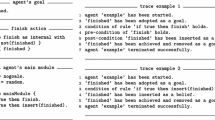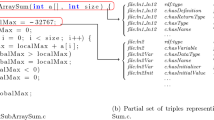Abstract
In order to reduce debugging effort and enable automated failure detection, we proposed an automated testing framework for detecting failures in cognitive agent programs in previous work. This approach is based on a minimal set of temporal operators that enable the specification of test conditions with sufficient expressiveness for detecting all failures in an existing failure taxonomy. We also introduced an according approach for specifying test templates that supports a programmer in writing tests. In this demonstration paper, the automated test framework for the Goal agent programming language that has been created for the Eclipse platform is introduced, with a focus on its practical aspects, i.e., how to use it to detect failures in cognitive agents. As fault localization is an important follow-up to failure detection, the integration of the test framework in the existing source-level debugger for Goal is discussed as well. In addition, an empirical evaluation of the automated testing framework implementation for Goal is presented based on the work of almost 200 novice agent programmers.
An earlier version of this paper was demonstrated at the 2016 AAMAS conference and was published in its proceedings [18].
Access this chapter
Tax calculation will be finalised at checkout
Purchases are for personal use only
Similar content being viewed by others
Notes
- 1.
See https://github.com/eishub/blocksworld for a description of this environment, and https://github.com/goalhub/agents/tree/master/src/main/goal/BlocksWorld for the agent system that is used as an example here.
- 2.
See Sect. 6.10 of the Goal Guide [10] for more details on percept types in Goal.
- 3.
We refer to Koeman et al. [15] for more details on the step out action.
- 4.
See http://goalhub.github.io/eclipse for a demonstration(video) of the testing framework implementation and instructions on how to install Goal in Eclipse.
- 5.
All (educational) agent environments are available at https://github.com/eishub.
- 6.
See https://github.com/eishub/BW4T and/or Jonhson et al. [14].
- 7.
Note that missing functionality was not considered a failure in these evaluations.
References
Bordini, R.H., Dastani, M., Winikoff, M.: Current issues in multi-agent systems development. In: O’Hare, G.M.P., Ricci, A., O’Grady, M.J., Dikenelli, O. (eds.) ESAW 2006. LNCS (LNAI), vol. 4457, pp. 38–61. Springer, Heidelberg (2007). doi:10.1007/978-3-540-75524-1_3
Bordini, R.H., Braubach, L., Gomez-sanz, J.J., Hare, G.O., Pokahr, A., Ricci, A.: A survey of programming languages and platforms for multi-agent systems. Informatica 30, 33–44 (2006)
Caire, G., Cossentino, M., Negri, A.: Multi-agent systems implementation and testing. In: Proceedings of the 4th From Agent Theory to Agent Implementation Symposium, AT2AI-4 (2004)
Dastani, M.: Programming multi-agent systems. Knowl. Eng. Rev. 30, 394–418 (2015)
Dix, J., Hindriks, K.V., Logan, B., Wobcke, W.: Engineering multi-agent systems (dagstuhl seminar 12342). Dagstuhl Rep. 2(8), 74–98 (2012)
Geer, D.: Eclipse becomes the dominant Java IDE. Computer 38(7), 16–18 (2005)
Gomanyuk, S.: An approach to creating development environments for a wide class of programming languages. Program. Comput. Softw. 34(4), 225–236 (2008)
Hindriks, K.V.: Programming rational agents in GOAL. In: El Fallah Seghrouchni, A., Dix, J., Dastani, M., Bordini, R.H. (eds.) Multi-Agent Programming: Languages, Tools and Applications, pp. 119–157. Springer, US (2009)
Hindriks, K.V.: Debugging is explaining. In: Rahwan, I., Wobcke, W., Sen, S., Sugawara, T. (eds.) PRIMA 2012. LNCS (LNAI), vol. 7455, pp. 31–45. Springer, Heidelberg (2012). doi:10.1007/978-3-642-32729-2_3
Hindriks, K.V.: Programming cognitive agents in GOAL (2016). https://bintray.com/artifact/download/goalhub/GOAL/GOALProgrammingGuide.pdf
Hindriks, K.V., Pasman, W., Koeman, V.J.: GOAL-Eclipse user manual (2016). https://bintray.com/artifact/download/goalhub/GOAL/GOALUserManual.pdf
Houhamdi, Z.: Multi-agent system testing: a survey. Int. J. Adv. Comput. Sci. Appl. 2(6), 135–141 (2011)
ISO: ISO/IEC/IEEE 24765: 2010 systems and software engineering - vocabulary. Technical report, Institute of Electrical and Electronics Engineers, Inc. (2010)
Johnson, M., Jonker, C., Riemsdijk, B., Feltovich, P.J., Bradshaw, J.M.: Joint activity testbed: blocks world for teams (BW4T). In: Aldewereld, H., Dignum, V., Picard, G. (eds.) ESAW 2009. LNCS (LNAI), vol. 5881, pp. 254–256. Springer, Heidelberg (2009). doi:10.1007/978-3-642-10203-5_26
Koeman, V.J., Hindriks, K.V.: Designing a source-level debugger for cognitive agent programs. In: Chen, Q., Torroni, P., Villata, S., Hsu, J., Omicini, A. (eds.) PRIMA 2015. LNCS (LNAI), vol. 9387, pp. 335–350. Springer, Heidelberg (2015). doi:10.1007/978-3-319-25524-8_21
Koeman, V.J., Hindriks, K.V.: A fully integrated development environment for agent-oriented programming. In: Demazeau, Y., Decker, K.S., Bajo Pérez, J., de la Prieta, F. (eds.) PAAMS 2015. LNCS (LNAI), vol. 9086, pp. 288–291. Springer, Heidelberg (2015). doi:10.1007/978-3-319-18944-4_29
Koeman, V.J., Hindriks, K.V., Jonker, C.M.: Automating failure detection in cognitive agent programs. In: Proceedings of the 2016 International Conference on Autonomous Agents & Multiagent Systems, AAMAS 2016, International Foundation for Autonomous Agents and Multiagent Systems, Richland, SC, pp. 1237–1246 (2016)
Koeman, V.J., Hindriks, K.V., Jonker, C.M.: Using automatic failure detection for cognitive agents in Eclipse: (demonstration). In: Proceedings of the 2016 International Conference on Autonomous Agents & Multiagent Systems, AAMAS 2016, International Foundation for Autonomous Agents and Multiagent Systems, Richland, SC, pp. 1507–1509 (2016)
Nguyen, C.D., Perini, A., Bernon, C., Pavón, J., Thangarajah, J.: Testing in multi-agent systems. In: Gleizes, M.-P., Gomez-Sanz, J.J. (eds.) AOSE 2009. LNCS, vol. 6038, pp. 180–190. Springer, Heidelberg (2011). doi:10.1007/978-3-642-19208-1_13
Runeson, P., Andersson, C., Thelin, T., Andrews, A., Berling, T.: What do we know about defect detection methods? IEEE Softw. 23(3), 82–90 (2006)
Wielemaker, J., Schrijvers, T., Triska, M., Lager, T.: SWI-Prolog. Theory Pract. Logic Program. 12, 67–96 (2012)
Winikoff, M.: Novice programmers’ faults & failures in GOAL programs. In: Proceedings of the 2014 International Conference on Autonomous Agents and Multi-agent Systems, AAMAS 2014, International Foundation for Autonomous Agents and Multiagent Systems, Richland, SC, pp. 301–308 (2014)
Zhang, Z., Thangarajah, J., Padgham, L.: Model based testing for agent systems. Softw. Data Technol. 22, 399–413 (2008)
Author information
Authors and Affiliations
Corresponding author
Editor information
Editors and Affiliations
Rights and permissions
Copyright information
© 2016 Springer International Publishing AG
About this paper
Cite this paper
Koeman, V.J., Hindriks, K.V., Jonker, C.M. (2016). Using Automatic Failure Detection for Cognitive Agents in Eclipse (AAMAS 2016 DEMONSTRATION). In: Baldoni, M., Müller, J., Nunes, I., Zalila-Wenkstern, R. (eds) Engineering Multi-Agent Systems. EMAS 2016. Lecture Notes in Computer Science(), vol 10093. Springer, Cham. https://doi.org/10.1007/978-3-319-50983-9_4
Download citation
DOI: https://doi.org/10.1007/978-3-319-50983-9_4
Published:
Publisher Name: Springer, Cham
Print ISBN: 978-3-319-50982-2
Online ISBN: 978-3-319-50983-9
eBook Packages: Computer ScienceComputer Science (R0)




